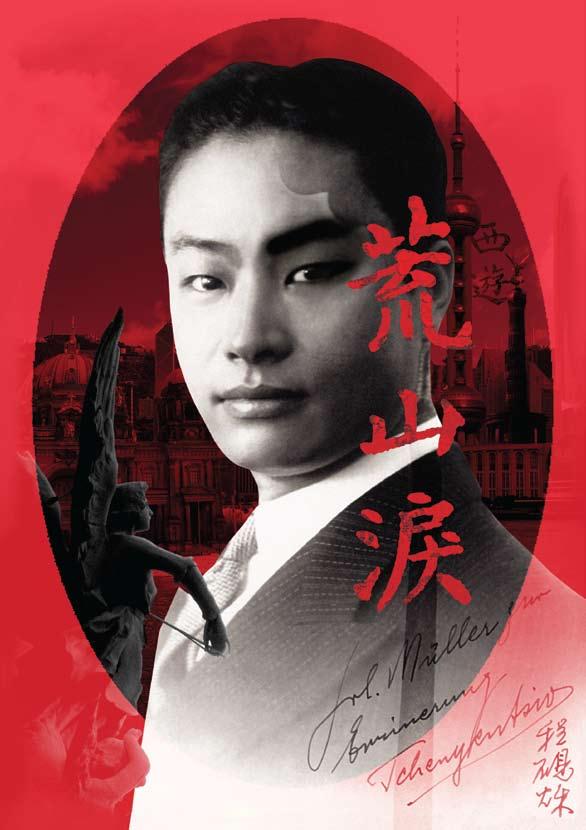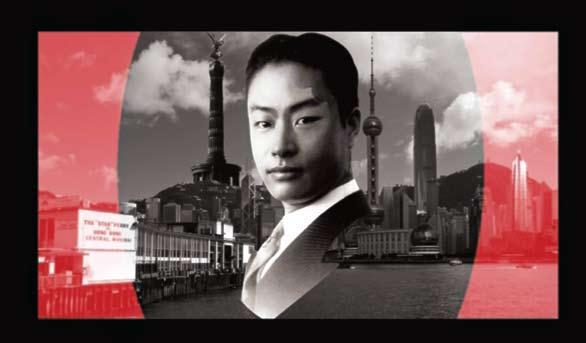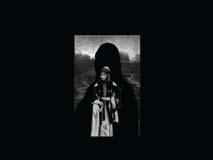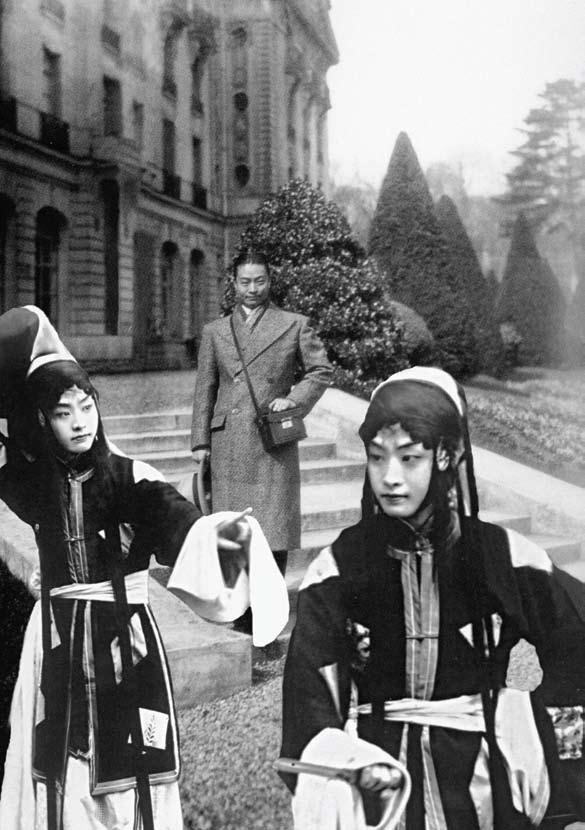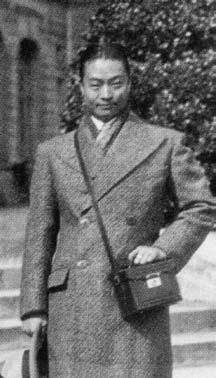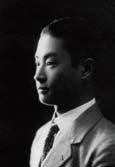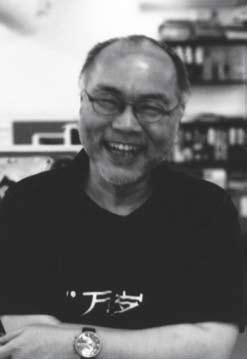In the name of Tears of Barren Hill
文:榮念曾
我對香港藝術節是有看法的,就如我 對香港文化交流體制的現況,同樣有看 法。或許因此我對程硯秋感興趣;或 許因此我對以各種跨越(包括文化,性 別),拓展辯證空間為己任的藝術工作 者(程硯秋正是其中之一)特別感到 興趣。
我們心目中的藝術節,除了提供文化消 費之外,本來可以是推動跨越文化交流 合作的平台,拓展辯證藝術空間的平 台;我們的藝術節本來應該是推動香港 多元文化發展的先驅,也應該是拓展藝 術辯證空間的先驅。程硯秋在他的時 代,是一名真正跨越,拓展辯證空間的 藝術工作者;我將程硯秋的文化交流經 驗為引子的創作,放在藝術節中,是我 對香港藝術節及文化交流體制的評議; 也是期待。
上個世紀三十年代北京戲曲界及程硯秋 所需處理的社會定位問題,市場問題及 創作傳承問題,和今天文化藝術界所需 處理的其實沒有太大分別;這正好讓我 們思考,這 80 年怎麼好像白白地過去 了。在那個年代,程硯秋直覺地認為只 有離開熟悉的環境,離開北京,離開中 國,才有新的辯證空間,才有學習空 間。他對交流的看法,倒沒有所謂「政 治正確」的民族國家主義自卑自大的情 意結,他的「自卑」是個人的,他只是
by Danny Yung
I have my own way of looking at the Hong Kong Arts Festival, just as I take a certain stance regarding the system of cultural exchange in Hong Kong. Maybe these are the reasons why I became drawn to Cheng Yanqiu or, rather, developed a special interest in artists like him who cross all kinds of boundaries (cultural, gender, etc) to widen the scope for dialectics. Apart from providing an avenue for cultural consumption, our Arts Festival has the potential to become a platform for the promotion of cultural exchange and collaboration, and to expand the dialectics on the arts. In fact, our Festival should become a pioneer and help to promote cultural diversity in Hong Kong. By using Cheng’s experiences in cultural exchange as the prologue to my own Festival contribution, I am not only giving my assessment of the current situation, but expressing my hopes for the Hong Kong Arts Festival and for Hong Kong’s system of cultural exchange.
During the 1930s, Cheng Yanqiu and the Beijing opera profession had to deal with their roles in society, the market, creativity and the continuity of tradition — problems not so different from those faced by people in the profession today. It makes me wonder why the intervening 80 years seem like a void! Living in that earlier era, Cheng intuitively felt that only by leaving his familiar environment, leaving Beijing, and even China, could he find space for new discoveries and new dialectics. His attitude to exchange was not coloured by any sense of ‘politically correct’ nationalism, or the underlying superiority/inferiority complex with which it was often associated. Rather, Cheng’s sense of inadequacy was purely personal. What motivated
好學,也有好奇,當然也有好勝;但是 他確實知道跨越對拓展的重要性。1932 年,程硯秋 28 歲,他已是京師數一數二 的四大名旦,他放下如日中天的事業, 前往歐洲。在德國,他參觀了教堂,教 室和劇院,然後毅然決定申請入學,重 頭學起,再做學生。
在柏林的教堂裏,程硯秋清唱了一段 《荒山淚》。其實,我並不覺得《荒山 淚》是程硯秋的代表作,但是有了這一
him was a passion for learning, a natural curiosity, and a healthy dose of ambition. He also understood the importance of crossing cultural boundaries for development.
When Cheng went abroad in 1932 he was 28 years old, and one of the top divas (Dan) in Beijing Opera. He gave up his soaring career, went to Germany, and visited cathedrals, schools and opera houses. He then decided to enrol in an educational institution — to begin a new chapter of his life. Whilst in Berlin, Cheng sang an aria from
段教堂故事,正好啟發我去創作一台有 關文化跨越,藝術跨越的實驗劇場。在 這次借《荒山淚》為名的實驗中,我由 程硯秋的清唱《荒山淚》開始,跨越到 比他早的西方作曲家巴赫、莫扎特、威 爾第的創作,以及和他同期的歌手比 莉.荷利黛、鋼琴家格蘭.顧爾德、電 影導演里妮.烈芬史托;通過串連起他 們的創作經歷,去尋找跨越實驗創作 立體化的感覺。在劇場中,我嘗試在教 堂、教室和劇院的空間裏,尋找過去和 未來的關係,當然更重要的是,這次跨 越實驗有和我合作多年的江蘇崑劇坤生 石小梅,以及第一次合作,來自河北和 湖北的年輕老生藍天和花臉董洪松的參 與。石小梅「反串」女角,藍天和董洪 松跨越行當,他們的大膽跨越,令我對 傳統戲曲的未來發展感到樂觀。
78 年前程硯秋在創作《荒山淚》時 26 歲;和我合作的兩名年輕演員藍天和 董洪松年紀相若。我們在創作實驗工作 坊中討論《荒山淚》和程硯秋,對他們 兩位有一定的督促及啟發。藍天在實驗 試唱戈爾德堡變奏曲的調門時,也在想 像程硯秋試用西方音樂來譜李白杜甫, 也在想像他在實驗西方唱腔混合戲曲唱 法,也在思考目前的教育制度、創作方 法、社會環境以及所謂美學「純正」價 值觀;最重要他們也開始思考當日程硯 秋是如何思考的問題。當然,他們沒有 僭越,將自己去和程硯秋做比較。畢竟
Tears of Barren Hill, unaccompanied by music, in a church. Although I don’t think the piece his best, the episode inspired me to put together an experimental performance about the crossing of boundaries in space, in time, in arts and culture. My endeavour takes Cheng’s rendition in the church as a starting point, and crosses over to incorporate his Western predecessors (Bach, Mozart and Verdi) as well as his contemporaries (Billie Holiday, Glenn Gould and Leni Riefenstahl). By weaving together all these creative experiences, I try to look for the concrete experience of ‘crossing boundaries’, and find the relationship between the past and the future — within the setting of the church, the classroom and the theatre, on stage today.
Of course, what matters even more in this project are my interactions with my collaborators, Shi Xiaomei, the Kunju artist who has worked with me on many occasions, and two young Beijing Opera artists — Lan Tian from Hebei province and Dong Hongsong from Hubei province, with whom I am collaborating for the first time. Shi is trained and well known for her crossplaying in male roles, but she will ‘uncross’ to play a female here, whilst Lan and Dong crossover to roles they do not usually play. Their courage to cross boundaries and experiment fuels my optimism about the future development of traditional Chinese opera.
Seventy - eight years ago, when Cheng was 26 (the kind of age that Lan and Dong are now), he wrote Tears of Barren Hill. And in our discussions about Cheng and his works my collaborators were very much inspired and motivated. Whilst Lan was working on a vocal rendition of Bach’s Goldberg Variations, he was also imagining how he might set the poetry of Li Bai and Du Fu to a Western score, or how he could fuse Western and Chinese operatic styles of singing. He also spent time reflecting on the education system, creativity, the social environment and what constitutes a ‘pure and proper’ value system in aesthetics. In all this, what matters most is that Lan and Dong began to ponder how Cheng himself might have thought about these things. Of course, they never over - stepped the mark by comparing themselves to Cheng. After
時代不一樣、環境不一樣;藍天、董洪 松的成長經歷和目前社會的情況,和程 硯秋的1930年代沒有可能平排比較。但 是程硯秋的實驗、前瞻精神常常令大家 感動。我們也在想,當今社會各種條件 比1930年代好百倍,為何我們的文化藝 術戲曲界墨守成規,劃界自限?為何我 們藝術家的思考和行動比他當日好像更 保守?
78 年前程硯秋創作反戰作品《荒山 淚》,是他對當日戲曲界創作停滯不前 的一次反省,也是在自我評議下自強的 一次創作;同時,也是向當日的學術界 文化界的一次表態。那次的實驗,對當 日保守知識份子低貶戲子的犬儒心態, 是一枝當頭棒。今天我為了紀念程硯秋 的原創實驗《荒山淚》,我想還是會成 為一般「藝術節」中無傷大雅的文化消 費節目。但是,我還是樂觀地希望, 在被消費之餘,對合作發展的團隊及 觀眾們,能引起些許想法和討論。通過 參與,或許能共同探討在保存傳統的 基礎上,發展傳統再創造的實驗方法。
同時,在舞台上下能引起大家對強勢政 治經濟發展下文化體制健全化的討論, 對文化交流及創意教育體制健全化的討 論。如果,因此能引起大家對實驗藝術 的關注,對多元文化發展的關注,對拓 展辯證空間的關注,我想程硯秋逝世 50 年後如果地下有知,一定會覺得之前走 過的路沒有白走。
all, times have changed. There is no exact parallel between what Cheng went through in his formative years in the 1930s and what Lan and Dong are going through today. Nevertheless, Cheng’s bold experiments and progressive spirit continue to move us. And although the conditions of our modern existence are a hundred times better than those of the 1930s, I wonder why our culture and arts, including Chinese opera, are still so conventional and bound by so many ‘mind - forged manacles’. It seems that our contemporary artists are suffering from these self - imposed boundaries, even more than during Cheng’s time.
Cheng Yanqiu created the anti - war piece Tears of Barren Hill firstly as a reflection on the creative stasis of the Chinese opera world; secondly as an attempt to upgrade his art through self - examination; and lastly, as a personal statement on the academic and cultural circles of his day. His experiment struck a triumphant blow at the conservative intelligentsia who turned up their noses at lowly opera performers. Although I intended my experimental performance of Tears of Barren Hill to be a tribute to Cheng, I think it is bound to become just another harmless piece of cultural consumption, served up by arts festivals. Yet, still, I optimistically nurse the hope that, consumption aside, it might generate some ideas and discussions among the participating groups and audiences. Maybe, through participation, we can join hands to explore ways to preserve and develop tradition, and then build on its foundations to create experimental forms. At the same time, if those on stage and those in the audience can be stimulated to start a debate on how to achieve a sound cultural system, even under the dominance of politics and economic development, and if the performance can arouse public interest in experimental art, in the development of cultural diversity, and in expanding the scope for dialectics — then Cheng Yanqiu probably would have felt his quest was not in vain, were he to know about this performance, 50 years after his death.
Translated by Maggie Lee
《西遊荒山淚》
教堂
我是來自河北的藍天,剛才是來自湖北的董 洪松。我是老生,董是花臉;我們對跨越角 色學習程派藝術是如履薄冰;但在知道更多程 老師的實驗精神,才開啟對自己的評議。我
現在借這個虛擬教堂,實驗一段《荒山淚》唱 腔;曲詞是這樣的:「他人好似兒夫面,怎不 回頭交一言?看看將近又離遠,忽然落後忽在 前……。」
學校
1933 年程硯秋見證希特拉踏上德國政治舞台 的正中央,希特拉當選德國總理時揮手自如, 彷彿理所當然。他有他的魅力,就如列根有列 根的魅力,毛有毛的魅力。他們都是在順應民 意引玩潮流?還是在順應潮流引玩民意?程硯 秋眼中德國的規律和條理,後面原來都是壓 抑,形成往後文化失焦的局面。
你現在聽到的音樂是一個實驗跨越的鋼琴家演 奏作品的再創造,那是加拿大的格蘭.顧爾 德。他生於 1932 年,正是程硯秋前往歐洲那 年。這是顧爾德的錄音放慢版,他彈的是巴赫 在 1741 年創作的戈爾德堡變奏曲。顧爾德在 1958 年已風靡歐洲;這一年,程硯秋正面臨 另一種跨越 生和死的跨越。
火車站
你現在聽到的是 30 年代開始風靡西方樂壇的 爵士歌手比莉.荷利黛,那是她在 19 58年的 錄音。錄音的時候,她的身體狀況並不太好, 有些緊張,當她走進錄音室時,所有樂師都起 立鼓掌向她致敬歡迎;這令她放鬆。那是她一 生最後一次的錄音。錄音那天,正是程硯秋去 世前夕。比莉.荷利黛在次年過身。
劇場
在動亂中,舞台下何處不是舞台,劇場外何處 不是劇場,在戰亂中的舞台上下劇場內外,生 離死別是無窮生死場。程硯秋委約金仲蓀創作 政治正確的《荒山淚》,寫於戰亂中1930年的 北京。隔了大半世紀,我們遠距離的在這裏, 冷靜地,默默地,心神恍惚地,進入戲內戲外 的《荒山淚》。
你看到的是德國最重要的電影導演里妮.烈芬 史托於 1934 年在紐倫堡拍攝的納粹全國黨大 會,她用了 30 部攝影機拍攝及剪輯成的經典 《意志的勝利》,完成了希特拉的目的 ── 成 功塑造了極具煽動性的納粹形象,也成為日後 一切宣傳片的典範,包括六九文革十一慶典至 今天所有廣告片。她拍攝該片時值程硯秋完成 歐訪次年。
機場
我們懷念程硯秋,是懷念他的精神及他的實 驗;我們尊重程硯秋,是尊重他的態度及他的 勇氣;他的唱做唸打自有他的韻味,去重複重 現這些韻味充其量是模仿;如果能延伸這些韻 味背後的精神和態度,我們才不會淪入懷舊的 陷阱及懷舊文化的消費。我們希望他的精神和 態度能帶給文化界應有的反省。
無論我們是在台上或台下,幕前或幕後工作, 無論我們是演員或關心藝術發展的觀眾,我們 撫心自問,我們對文化發展及跨文化交流和跨 文化合作有沒有想法和評議?我們對政治經濟 發展下文化體制的變動有沒有態度?如果我們 有這樣的關注,我想程硯秋地下有知,一定會 覺得他走的路,並沒有白走。
一代一代,我們穿越無數的舞台,一代跟着一 代,繼續穿越重重光線,找尋未來的方向。
Cheng Yanqiu’s Crossover Journey to the West
文:張秉權
給戲曲引入現代意識,讓傳統與當代發 生碰撞,是近年頗令人注目的一些劇場 實驗。銳意提倡「純粹戲劇」的李六 乙,其《穆桂英》與《花木蘭》等「新 戲劇」,代表的是一個方法或方向,而 榮念曾這些年堅持走的,又是另一條實 驗的道路。
這麼多年來,榮念曾早已不懈地做了大 量的這類工作,無論是以傳統戲曲「一 桌二椅」為基本格局的《中國旅程》, 即由各地華人導演嘗試的,以反思劇 場本質為務的實驗,或者是以《獨腳 戲》、《諸神會》等為名的「實驗中國傳 統戲曲」,都各有風華。而《佛洛伊德 尋找中國情與事》和《挑滑車》兩劇, 都有圓滿自足的美學依據而能啟發思 考,我以為是尤其完整的。而即將推出 的下一回實驗,是《西遊荒山淚》。
其實,無論要處理的是什麼內容,所謂 「實驗」,強調的應該都是挑戰舊有觀 念、超越既定界線的努力。而這《西遊 荒山淚》,很可能是作品內容與這種實 驗觀念最吻合的了。
因為,它處理的,是程硯秋怎樣努力超 越自己。
二十世紀的二、三十年代,是中國文化 界至為重要的一頁。一方面是日本的軍
by Cheung Ping-kuen
In recent years, prominent theatre experimentalists have generated a buzz introducing contemporary ideas into traditional Chinese opera, and creating chemistry between tradition and modernity. Among these are the artists who propound ‘pure theatre’ — artists like Li Liuyi, who produced ‘nouveau theatre’ pieces Mu Guiying and Hua Mulan. Another, is Danny Yung, who has persevered for years with his own, unique experimental approach.
Yung developed his concepts through his project Experimenting Tradition and productions such as Meeting of the Gods, Solo Performances, A Journey to the East, The Outcast General and Sigmund Freud in Search of Chinese Matter and Mind. Yung’s latest experimental venture is Tears of Barren Hill.
Regardless of content, anything that calls itself ‘experimental’ ought to make an effort to challenge established values and transcend boundaries. Tears of Barren Hill may prove to be the perfect marriage between content and experimental spirit because it tells the story of how Cheng Yanqiu strove to rise above himself.
The 1920s and 30s were significant decades for Chinese culture. While the spectre of Japanese military aggression spread across the country, fights for political dominance between the Nationalists and Communists intensified. Weighed down by political and economic problems, and alarmed by escalating foreign and domestic crises, China’s cultural elite dug deep into its heritage in search of wisdom. At
事行動日趨嚴重而國難日亟,一方面是 國共兩黨的矛盾愈見惡化,在政治與經
濟、內政與外交都是問題重重的年月, 中國文化界精英既苦心孤詣地回溯傳統 以推敲智慧,更如飢似渴地汲取外國文
化的營養,企圖借鏡他人的先進經驗以 助新變。事實上,即以戲劇界而論, 既早已引進現代西洋的模式而力倡「話 劇」,並已有不少頗成熟的作品,又和 戲曲界的代表人物衷誠合作,試圖探索 新路,闖出更多藝術上的可能,周信芳 在南國社的《潘金蓮》中飾演武松,是 其中顯例。而戲曲界的開放態度,除了 這類跨界合作外,廣為人知的,自然包 括梅蘭芳在 1919 和 1924 年兩次訪日,
以及於 1930 及 1935 年到美國及蘇聯訪 問演出,把戲曲藝術帶到西方去,使
the
same time, however, they hungrily devoured any aspect of foreign culture that could guide them towards reform.
Early on, Western theatre styles were imported, and plays with Western voices and ideas were enthusiastically promoted. Not only were many accomplished works staged, but the artists involved initiated cross - disciplinary collaborations with veterans of Chinese opera. These collaborations explored new creative frontiers. Most notable amongst these collaborations was the Beijing opera virtuoso Zhou Xinfang’s performance as Wu Song, in Golden Lotus by Nanguo Company. Another example of artistic open - mindedness was Mei Lanfang’s overseas trips to Japan, the US and the Soviet Union. During these trips Mei introduced Chinese opera to the West, and enabled the Chinese performing arts to take its place in the development of world theatre.
Cheng Yanqiu also embarked on a quest. In 1932 he went for more than a year on a study tour of France, Germany, Italy, Switzerland and the UK. His mission was to absorb Western art and broaden his horizons, whilst simultaneously re - examining the prospects and direction of traditional Chinese opera. His trip provided the impetus for Danny Yung to stage Tears of Barren Hill.
Cheng’s journey was a profound and insightful cultural exchange. He paid visits to theatres, universities, film companies and museums, and saw many different kinds of performances. He also attended conferences, went on book hunts, and networked with people from various circles. In all this he understood the true meaning of ‘exchange’ — that it was essentially ‘people - orientated’.
Cheng’s main objectives were to expand his own horizons and enrich his own artistry through international exchange. Convinced that a European education would help to clarify his thoughts, he made up his mind to stay and study in Germany and wrote to his wife asking her to make preparations to
程硯秋攝於歐遊期間
Cheng Yanqiu in Europe
中國的表演藝術,正式參與了世界戲劇 的發展過程。而程硯秋在 1932 至 1933 年之間,在歐洲法、英、德、意與瑞士 等國考察了超過一年,廣泛地接觸、學 習西方的藝術,同時更思量中國傳統戲 曲的發展方向,也是值得特別注意的, 這正是榮念曾創作《西遊荒山淚》的 緣起。
程硯秋這次歐遊,是一次真正的具深度 的文化交流。他參觀各種劇場、大學、 電影公司、博物館,觀摩不同類型作品 的演出,參加會議,搜求書籍,他廣 交各界朋友,他知道交流的意思是以 「人」的作業、「人」的思考、「人」的 溝通為基礎,他的主要目的並不是介紹 歐洲人認識京戲。換言之,他是自覺不 足,故而要藉交流去開拓眼界,去思考 戲曲的整體發展以至個人發展的方向。
因此,這次交流是個真正的學習過程。
他更打算留在德國深造,認真地學習幾 年才回國,並去信其夫人,預備接家人
來歐定居。為顯決心,他甚至吃肥肉、 飲烈酒、抽雪茄,以增體重,並寄回照 片,表示難以短期回到舞台。可是由於 客觀形勢所限,才只好打消這個念頭。
交流要成功,必須先開放自己。而二、 三十年代的開放精神,真是惹人遐思 的交流就是越界。這次榮念曾就請來 兩個年輕的高水平演員,讓他們開放 自己,來做跨行當的越界實驗。學戲 曲,必定進入一個「行當」,武生、鬚 生、青衣、刀馬旦,諸如此類,那就是 「我」,從現實的「我」進入劇場內的 那個藝術的「我」,乃是學習藝術、建 立自身、成就自身的必需過程。因此, 行當是演員表演藝術的依據。
然而,要是有了這麼一個機會,這些演 員竟跳出這個藝術上習慣了的「我」,
bring his family there. To show his committment to the idea, Cheng ate fatty meat, drank hard liquor and smoked cigars. He then sent photos home to show the public in China that, given his present state, he was unable to return to the stage (for the short term, at least). However, due to unforeseeable circumstances, Cheng eventually had to surrender his ambitious plans. Exchange can only happen when one opens oneself up and engages in some form of crossover. To this end, Yung has enlisted two young and highly accomplished Beijing opera actors to ‘open up’ and take part in an experimental exchange. In traditional Chinese Opera, apprentices have their hangdang assigned. (Roles — such as military male, bearded male, warrior female, young or middle aged lady.) These roles become their lifelong identity, their ‘self’. The actors go through a ritual to leave behind the real life ‘self’ so that they can step onto the stage and embody the artistic ‘self’. It is a long process in which they learn about art, and cultivate and shape their identities. In all senses, an actor’s artistry stems from his or her hangdang
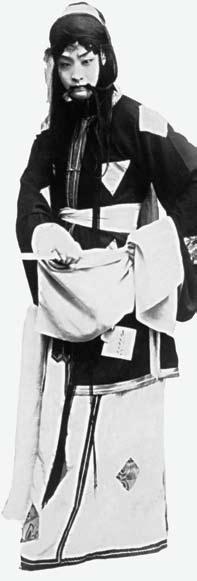
Production photograph from Tears of Barren Hill
進入另一個行當,認真地扮演另一些角 色,這一來是否會因而體會了更多?重 要的是,會否從體會「別人」的過程 而更認識「我」?因而將來回到習慣了 的行當的時候,可以有另一層別樣的處 理?當然,問題沒有絕對的答案。正如 旅行可以只是一次感官上的刺激,一次 暫別習慣的假期,但是,有些人可以借 旅行的機會而在另一陌生的時空中開 拓眼界,並返過頭來認識另一層次的自 己,獲得深刻的啟發。一切都是因人而 異的。
遊歷也好,旅行也好,行當的越界也 好,本質上都是一次超越自己的過程, 它「可以」引來新的發現,刺激思考, 思考自己未來的生命,當然也包括創作 的方向。
程硯秋六歲開始學藝, 11 歲登台演 出,13 歲時不幸遇上「倒倉」之厄, 卻又幸得羅癭公贖身,並為其制定學習 計劃,又得受教於梅蘭芳、王瑤卿等, 故而 18 歲初到上海,已能一炮而紅。
那是 1922 年。換言之,在 1932 年歐遊 的時候,程已是名滿杏壇的大家,其 「程派」已初成,而他卻在事業如日 中天的時候,看到自己的不足,自我檢 討,先是由「艷秋」改名「硯秋」,以
示不以色相為重,更而放下演出,長期 遊歐以增見聞,以了解西方戲劇原理與 趨勢,以思考自家戲劇應如何改進,這 是何等勇敢的決定?
2008 年,正好是程硯秋逝世 50 周年, 難道還有比演一個這樣版本的《西遊荒 山淚》更合適的紀念辦法?
Yet, if there were an opportunity for actors to step out of their accustomed artistic ‘selves’ and take up the role of a different hangdang, would that be an eye - opening experience for them? And, by stepping into another actor’s shoes, would they get a better understanding of their artistic ‘selfhood’? Perhaps it would give them a fresh, new interpretation of their own hangdang?
Whilst there are no clear cut answers, some actors do try to find new sensory stimuli, or take a break from old, habitual patterns. The way a person approaches such an opportunity depends entirely on their character. But, whether they regard it as a study trip, a holiday, or a crossover of hangdang, the essence of the quest is self - transcendence. In the process it could also become the catalyst for new inventions, contemplations or new directions in artistic creation.
Cheng Yanqiu became an apprentice at the age of six and made his stage debut at 11. He had the privilege of receiving tuition from virtuosos Mei Lanfang and Wang Yaoqing and, by the age of 18, was an overnight success.
That was in 1922 and by the time he made his European tour in 1932, he was master of his own ‘Cheng School’. Yet, he was not content to bask in his fame. Cheng was always looking for personal inadequacies to overcome. Reputedly, he changed his stage name, replacing the Chinese character Yan, which means ‘gorgeous’, with another same - sounding character that means ‘ink - stone’, thereby announcing that he did not want to succeed through good looks alone.
Now it is 2008! And I ask — can there be a more appropriate way of commemorating the 50th anniversary of Cheng’s death, than to perform this version of Tears of Barren Hill ?
張秉權 ,香港資深劇評人與戲劇教育工作 者,香港演藝學院人文學科系主任。
Translated by Maggie Lee
Cheung Ping-kuen is a renowned theatre critic and theatre educator. He is the Head of Liberal Arts Studies at the Hong Kong Academy for Performing Arts.
進念.二十面體 Zuni Icosahedron
進念.二十面體, 1982 年成立,為本地註冊非牟利慈善文化團體,以香港為基地,面向世界的 實驗藝術團體。從事多元戲劇藝術創作至今,原創劇場作品超過150齣,曾獲邀前往三十多個城 市演出,遍及歐、亞、美等地。二十多年間,一直致力拓展香港文化藝術新領域,積極推動國際
文化交流,主催藝術評論及文化政策研究等工作,並活躍於藝術教育和發展電子媒體及跨媒體等 新類型的藝術模式。1999年起獲香港藝術發展局「三年資助」,現為香港特別行政區政府資助團 體,也是香港最具代表性的國際實驗劇團。
進念自上世紀九十年代中開始,恆常地跟不同的傳統表演藝術家合作創作;同時,策劃在港成立 「非物質文化遺產( 表演藝術) 中心」,藉此推動相關的研究、發展及傳承的工作。2007年,進念 獲衛奕信勳爵文物信託及聯合國教科文組織的支持,舉辦了專家會議、公開講座及開設了香港非 物質文化遺產網頁(www.zuni.org.hk/ich)。多年來,進念跟傳統表演藝術家合作的演出、工作坊 及會議等曾分別在香港、台北、東京、新加坡及挪威的奧斯陸等地舉行。
Founded in 1982, Zuni is a Hong Kong based non - profit charity arts organisation. As an international experimental theatre company, Zuni has produced more than 150 original productions of alternative theatre and multi - media performances, and has been active in video, sound experimentation and installation arts, as well as arts education, arts criticism, arts policy and international cultural exchange. Over the years Zuni has been invited to engage in artistic exchange and give performances in over 30 cities in Europe, Asia and the US. The company was given a three - year grant by the Hong Kong Arts Development Council in 1999, to facilitate its creative operation, and is now financially supported by the Government of the Hong Kong Special Administrative Region. Zuni Icosahedron is the epitome of experimental theatre in Hong Kong.
Through its experience with various traditional opera artists since the mid 1990s, Zuni initiated and conceptualised the plan of Research and Development on Intangible Cultural Heritage (Performing Arts), with the aim of establishing an institute to foster the development and transmission of Intangible Cultural Heritage. In 2007, with support from The Lord Wilson Heritage Trust and UNESCO, Zuni organised a series of activities including expert meetings and public lectures, and launched the Hong Kong ICH website — www.zuni.org.hk/ich. Over the years Zuni has collaborated with various Chinese traditional performing artists in stage performances, workshops, seminars and conferences.
進念.二十面體由香港特別行政區政府資助 Zuni Icosahedron is financially supported by the Government of the Hong Kong
程硯秋
Cheng Yanqiu
程硯秋 (1904–1958) ,男,為京
劇四大名旦之一。
原名承麟, 1932
年起更名硯秋,改 字禦霜。幼年家道 中落,六歲投榮蝶 仙門下,練武功,
向榮春亮習武生。
一年後向名武生教師丁永利學戲,後因 扮相秀麗,改從陳桐雲習花旦,後發現
嗓音極佳,改學青衣,師從陳嘯雲。 11 歲登台演出,與趙桐珊、劉鴻聲、孫菊 仙等合作演出《桑園寄子》、《轅門斬 子》、《朱砂痣》等戲,以其超凡的唱、 唸、做、打文武之功,嶄露頭角,行內 外耳目一新。
1917 年他因嗓子倒倉,暫不演出,繼 續深造,學習繪畫、書法、舞拳練劍、 觀摩電影藝術。 1922 年他首次到上海
演出,引起轟動。 1923 年再到上海, 使上海觀眾欣喜若狂,藝術也逐步趨於 成熟。
從 1925 到 1938 年,程硯秋步入他「程 派」藝術的成熟期,此時程硯秋已經集 創作、演出、導演三者於一身。他面對 社會現實,編創了許多愛國主義和民主 主義的劇碼,如《文姬歸漢》、《荒山 淚》、《春閨夢》、《亡蜀鑒》等。名作 《荒山淚》於 1956 年由北京電影製片 廠拍成電影,為保留更多的程腔和水 袖,影片增加了很多新唱段(吳祖光改 編),並攝下了他結合劇情創作的二百 多種水袖表演形式。
Cheng Yanqiu was born in Beijing in 1904 and began to study Beijing Opera at the age of six. Cheng studied under Wang Yaoqing, learnt Wusheng from Rong Diexian, Huadan from Chen Tongyun, Qingyi from Chen Xiaoyun and Daomadan from Yan Lanqiu. He is honoured as one of the four great Dan actors of all time, along with Mei Lanfang, Shang Xiaoyun and Xun Huisheng.
Cheng first stepped onto a stage at the age of 11, and at 12 he appeared with Sun Juxian, Liu Hongsheng, Gao Qingkui and Yu Shuyan in performances of General’s Son to Be Executed and A Child Left in the Mulberry Garden, all of which earned him favourable reviews. After his initial success Cheng set up his own company and became well known for playing Qingyi and Daomadan in the Rainbow Pass and the Story of Su San, among others. During the 1920s he wrote and performed in many new operas such as the Blue Frost Sword, Lady Mei, The Dream of the Young Lady and The Unicorn Purse. All his operas were well received.
Cheng’s unique singing voice always deeply affected his audiences. He was renowned for his expressive portrayal of his characters’ feelings and for imbuing them with vivid, colourful detail. He also created many new ways of using the water sleeve, and improved the art of water sleeve for all Dan performers.
In 1932 Cheng took a tour of Europe to do research into the performing arts, visiting France, the UK, Germany, Belgium and Switzerland. After the founding of new China in 1949 he was appointed vice - president of the Chinese Academy of Traditional Opera. He wrote several books including Collected Works of Cheng Yanqiu and Selected Operas Performed by Cheng Yanqiu.
榮念曾
Danny Yung
編導/舞台設計 Director/Script Writer/Set Designer
榮念曾於 1982 年創立「進念.二十面 體」, 1985 年起出任其藝術總監。舞台 作品超過 150 齣,曾於日本、台灣、比 利時、德國、英國及美國等地演出。他 參與編導的作品包括:「中國旅程」系 列、「二三事」系列、「百年孤獨」系 列、「中國文化深層結構」系列等,曾 於北京、柏林、布魯塞爾、倫敦、慕尼 黑、紐約、新加坡、台北及東京演出。
2000年,榮念曾組織了分別於柏林及香 港舉行,為期11周的Festival of Vision文 化節,邀請了一千位來自 35 個亞洲 及歐洲城市的藝術家及文化工作者參 與。1999年的裝置作品應邀參與Inside/
Danny Yung founded the art collective Zuni Icosahedron in 1982, and has been Artistic Director since 1985. Yung wrote the script for Zuni’s first production Journey to the East - Part Five: Hong Kong - Taipei - Hong Kong, which opened in Taipei for the First Asian Drama Festival in 1982. Since then Yung has co - ordinated, directed, and produced more than 150 stage productions, including the One Hundred Years of Solitude series; the Chronicle of Women series; the Opium Wars series; the Journey to the East series; the Deep Structure of Chinese Culture series; the Two or Three Things … Hong Kong series; The Book of Mountain and Ocean; Four Grand Inventions; Sigmund Freud in Search of Chinese Matter and Mind; and In Search of Modern China. Performance tours have taken Yung and Zuni
相片提供:《號外》
Photograph: City Magazine
Out: New Chinese Art。2003年,在1a 藝術空間舉行《樹.人》個人展覽, 2007年的《「天天向上」── 榮念曾概 念漫畫展》在上海舉行的香港創意產業 文化交流計劃內公展。
1987 年起發起文化藝術政策的公開論 壇及文化政策學習小組,及成立兩個舉 足輕重的團體。1997年開始,協力創辦
了「亞洲藝術網絡」、「上海-香港-深 圳-台北城市文化交流會」、「城市文化 論壇及亞太區表演藝術網絡」。
榮念曾是香港藝術發展局的創局成員及 其藝術教育小組創組主席。2000年,再 次獲香港特區政府委任為藝發局委員。
2001年,策劃成立世界文化論壇,並於 2003年成為副主席。他曾兼任香港政府 中央政策小組成員,目前為香港特區政 府的多個有關創意工業及文化項目出任 政策顧問,包括西九龍文娛藝術區核心 文化藝術設施諮詢委員會成員。
近年,榮念曾與聯合國教科文組織合作 策劃藝術教育研究中心,非物資文化發 展計劃;另於 2006 年合作創辦香港首 間創意中學。榮念曾撰寫的文章題材廣 泛,主要以政策、藝術、文化與媒體為 主題。
to many international cities including Beijing, Berlin, Brussels, London, Munich, New York, Singapore, Taipei and Tokyo.
In 2000 Yung organised Festival of Vision — an 11 - week programme of cross - cultural festivals and conferences held in Berlin and Hong Kong. The festivals involved 1,000 artists and cultural practitioners from 35 cities in Asia and Europe. Yung is also a keen advocate of new art forms. His experimental films, video work and installation works have been shown at festivals in Berlin, London, Rotterdam, Edinburgh, Tokyo, Los Angeles and New York. He was selected as one of the 56 Chinese visual artists for the Inside Out: New Chinese Art in 1999. His solo exhibition Tree and Man opened at 1a Space Gallery in 2003, and in 2007 the Tian Tian Xiang Shang — Danny Yung Conceptual Comic Exhibition was held in Shanghai.
Since 1987 Yung has initiated a series of public forums on cultural policies. In 1990 he organised the Cultural Policy Study Group that has since produced several influential reports. In 1993 he was appointed by the Hong Kong Government to the ‘Working Group’ which in 1995 became a statutory body — the Hong Kong Arts Development Council. He was reappointed to the Council in 2000.
Beginning in 1997 Yung initiated several important arts networks in Asia, among them the Asia Arts Net, the City to City Cultural Forum, and the Asia Pacific Performing Arts Network. In 2002 he coorganised the World Culture Forum, and became its Vice - president in 2003. He was a former part - time member of the Central Policy Unit — a Hong Kong Government think tank — and is now a policy consultant to various governmental cultural and creative industry entities including the Core Arts amd Cultural Facilities of the West Kowloon Cultural Distrcit. Recently Yung developed a project with UNESCO focused on preserving and developing ‘Intangible Cultural Heritage’ in the Asia Pacific region. Yung is the founder and a board director of the first School of Creativity in Hong Kong and has written extensively on arts, culture and the media.
石小梅 Shi Xiaomei
特邀演出
Guest Performer
著名崑劇表演藝術家,國家一級演員。現為江蘇戲劇家協會副主席、中國戲劇家 協會理事、中國表演藝術學會理事。工小生,拜俞振飛、周傳瑛、沈傳芷為師。 主要作品有《牡丹亭》、《桃花扇》、《白羅衫》等。石小梅曾獲梅花獎、文華獎, 她的名字和藝術成就被國內眾多名人詞書收錄,亦被載入美國傳記協會編輯委員 會出版的《五千世界名人錄》和《世界名人錄》,2002年獲聯合國教科文組織和 文化部聯合授予「長期潛心崑曲藝術事業成績顯著的藝術家」稱號。
Shi Xiaomei is a National Class One performer specialising in Xiaosheng (young male) roles. She studied with several famous performers including Yu Zhenfei, Zhou Chuanying and Shen Chuanzhi. Shi won the 5th Plum Blossom Award for Chinese Theatre, the first Literary Arts Award of Jiangsu and the 5th Wenhua Award. Her acclaimed performances include The Peony Pavilion, The Peach Blossom Fan , and The White Silk Dress . She is now the Vice - president of the Jiangsu Dramatists’ Association.
藍天
Lan Tian
演員 Performer
藍天,工文武老生和武生。1997年考入上海市戲曲學校京劇班,2004年考入上
海戲劇學院戲曲學院戲表專業。先後師從張少春、童強、關松安、王雲橋、倪海 天、奚中路等老師。曾獲1994年全國新苗杯京劇邀請賽一等獎;2005年獲上海 戲劇學院綜合獎學金一等獎。
Lan Tian entered the School of Chinese Opera in the Shanghai Theatre Academy in 1997, majoring in Beijing Opera. He specialises in playing Laosheng (senior male) and Wusheng (military male) roles. His teachers include Zhang Shaochun, Tong Qiang, Guan Songan, Wang Yunqiao, Ni Haitian and Xi Zhonglu. Lan has received many awards including First Prize in the China Budding Artist Competition (Beijing Opera) in 1994; and First Prize in the Overall Achievement Scholarship at the Shanghai Theatre Academy in 2005.
Performer
董洪松, 2002 年於湖北省藝術學院畢業, 2004 年考入上海戲劇學院戲曲學院 戲曲表演專業,主工花臉。先後師從楊樹榮、舒建楚、李長春、陳鴻鈞、朱玉 峰、康萬生等。屢獲獎項,包括中國第二屆新苗杯湖北地區金獎。擅演劇碼包括 《大.探.二》、《坐寨盜馬》、《赤桑鎮》、《李逵探母》等。
Dong Hongsong graduated from the Hubei Arts School in 2002. He went on to study in the School of Chinese Opera in the Shanghai Theatre Academy, majoring in Performing Arts. He specialises in playing Hualiang (painted face) roles. His teachers include Yang Shurong, Shu Jianchu, Li Changchun, Chen Hongjun, Zhu Yufeng and Kang Wansheng. Dong has won several awards including a Gold Award in the China Budding Artist Competition (Hubei province).
辜懷群
Vivien Ku
藝術顧問
Artistic Consultant
台灣東海大學學士;美國威斯康辛大學碩士;美國密歇根大學博士;辜公亮文教基金會執行長,新舞 臺表演廳館長。
Vivien Ku started her career in 1977 as a college instructor in the Department of Foreign Literature and Languages at the National Taiwan University. In 1988 she began producing Chinese Opera and continues to produce two productions each year. Since 1997 she has been Managing Director of the Novel Hall for Performing Arts, the only private venue for performing arts in Taiwan.
徐幸捷
Xu Xingjie
藝術顧問
Artistic Consultant
上海戲劇學院戲曲學院院長、上海戲劇學院院長助理、上海市戲曲學校校長、上海市文化人才認證中 心顧問。1966年於上海市戲曲學校京劇班畢業。曾任京劇演員,上海京劇院副院長,上海京劇院總經 理,上海師大表演藝術學院黨委書記、常務副院長,上海戲劇學院戲曲舞蹈分院黨委書記、常務副院 長等職。主編的《上海京劇志》(上海文化出版社出版)獲第二屆文化部文化藝術科學優秀成果獎三 等獎。
Xu Xingjie graduated from the Shanghai School of Chinese Opera in 1966 with a major in Beijing Opera. For many years he was a performer of Beijing Opera, vice - president of the Shanghai Beijing Opera Academy and general manager of the Shanghai Beijing Opera. He is currently President of the School of Chinese Opera of the Shanghai Theatre Academy; Party Secretary of the Shanghai Theatre Academy; and Principal of the Shanghai School of Chinese Opera. His editorial publication Beijing Opera in Shanghai received the Third Prize in the Achievements in Culture, Arts and Science Award presented by the Ministry of Culture.
田蔓莎
Tian Mansha
創作顧問 Creative Adviser
田蔓莎,國家一級演員兼導演,現任上海戲劇學院戲曲學院副院長及教授、上海青年京崑劇團副團 長。田蔓莎曾獲中國文化部第七屆文華大獎表演獎,中國戲劇第九屆、第二十屆二度梅花獎,上海第 八屆白玉蘭戲劇表演主角獎,2005 年獲得美國亞洲文化協會春天舞台製作研究員基金,2006 年應邀 在柏林世界文化中心《在過去與未來的中國》文化節中策劃大型文化交流演出活動。
田蔓莎的川劇代表作有《死水微瀾》、《目連救母》、《武松殺嫂》等。自導、自演實驗劇碼有《情 歎》、《思凡》、《馬克白夫人》等。
Tian Mansha is a National Class One performer and director, and currently works as a Professor and Assistant Dean of the School of Chinese Opera at the Shanghai Theatre Academy. She has received numerous awards including the Ministry of Culture’s 7th Wen Hua Award; and Shanghai’s 8th White Champac Medal for Best Actor in a Lead Role. She has twice won the prestigious Chinese Opera Plum Blossom Award and in 2006 was the curator of the Chinese Opera cultural exchange programme for the House of World Cultures in Berlin.
Tian’s signature performances include Dead Water Ripples, Mulian Saves His Mother, and Wu Song Kills His Brother’s Wife. Her directorial works include Lady Macbeth and One Table Two Chairs
陳克華
Chen Ko - hua
歌詞 Lyrics
陳克華醫生為台北榮民總醫院眼科部角膜科主治醫師與國立陽明大學眼科副教授。曾多次獲中國時報 文學獎和聯合報文學獎,金鼎獎最佳歌詞獎,金鼎獎最佳專輯及台北文學獎新詩組得獎者,教育部文 藝創作獎等;出版多本詩集、散文集、小說,亦曾舉辦多個攝影、繪畫展覽。
Dr Chen Ko - hua is Associate Professor in the Department of Ophthalmology at the National Yang Ming University. He has won several awards including First Prize for poetry in the Taipei Literature Awards; the Literature and Arts Creation Award from The Ministry of Education of the ROC; and various literary awards from the China Times and United Daily News
Nerve
音樂 Music
Nerve為許敖山發表音樂的化名,生於香港。香港演藝學院音樂學士(作曲及電子音樂),實驗電子音 樂組合VSOP成員,自1999年起參與多個進念.二十面體創作。2004年香港小交響樂團委約創作及演 出其第一首管弦樂作品《四季Re - Autumn》。2006年獲邀到芬蘭作實地聲響考察研究。
Nerve is the alias used by Steve Hui to present his music. Born in Hong Kong, Hui graduated from the Hong Kong Academy for Performing Arts with a Bachelor Honours Degree in Composition and Electronic Music. He is a member of the experimental electronic music group VSOP and his first orchestral composition Re - Autumn was commissioned and performed by the Hong Kong Sinfonietta in 2004. In 2006 Hui helped create Hearing Helsinki, an audio project based in Finland.
潘德恕
1984年開始為多個劇場、電影及錄像等不同藝術媒介作品擔任音響設計、混音及作曲部份,並製作原 聲唱片。劇場參與包括1999年香港藝術節的《打樂十八層》;電影則有:陳耀成導演的《北征》、《錯 愛》。1997年始參與不同形式的音樂會表演,負責電腦、電子及敲擊樂器部份。1999年開始發展以手 鼓、電腦及合成樂器與不同樂手如唱片騎師、鼓手、鍵琴手及結他手等玩即興派對音樂。
Pun Tak - shu has been a sound designer since 1982 when he created the music for Zuni Icosahedron’s video performance “XXX” Video Show. He also worked on the Hong Kong Arts Festival commission Boombastic Verses in 1999. Pun has collaborated with numerous artists and groups including two movies by Evans Chan — Crossing and Journey to Beijing — and has produced his own video works, photographic works and graphic designs.
黃志偉
John Wong
錄像 Video
1999年於香港演藝學院電影及電視系畢業。近年為進念.二十面體、非常林奕華及劇場組合等創作多 個舞台錄像作品。亦曾為容祖兒及黃耀明的音樂會創作錄像。首部長片《旅客》於第 27屆香港國際電 影節放映。
John Wong graduated from the Hong Kong Academy for Performing Arts in 1999 with a major in Film and Television. He has created video works for Zuni Icosahedron, Edward Lam Dance Theatre and Theatre Ensemble and in 2006 designed live video for the concerts of Joey Yung and Anthony Wong. Wong’s debut film The Tourist was screened in the 27th Hong Kong International Film Festival in 2002.
